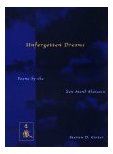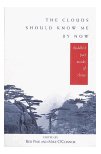|
Contents » Cover |
||
|
Essays
The flowering of Buddhism in the West has brought many gifts including the fragrant blossoms of Buddhist inspired poetry. It isn't difficult to find Asian influences in much American poetry since the 1960s, but the past few years has seen a flood of translations of more Asian poets, and the publication of English language Buddhist poems. What Book!?, small in hand, but with a full Buddha stomach, gathers myriad streams of Buddhist-inspired poems into one ocean. With poets ranging from Kenneth Rexroth to bell hooks, and scores of lesser known poets, there's something here for everyone. It's surprising that the Buddha's robes can inhabit so many western styles of verse. But that's the point—mindfulness, Buddha-thought, Buddha-hood, transcends form and Gary Gach has done well in editing this anthology. Such a smorgasbord requires some patience from the reader. I found many poems which seemed too much like others, and the tendency toward self-consciousness instead of ego-less quiet weakens the scope. What Book!? accomplishes much however, presenting a broad view of Western Buddhist thought, practice, and poetics. And the jewels in the heart of this lotus are worth the jump from lily pad to lily pad. Like these two:
My robe hangs in the garden, These two spaced and silent poems provide little example of the more raucous energy in some of the other poems such as Antler's "American History in Context" or Gary Snyder's "Smokey the Bear Sutra." Both poems prove mindfulness can be, is, both activity and poise. The anthology closes happily with three appendices: Allen Ginsberg's two writing manuals "Mixed Writing Slogans" and "Mind Writing Exercises," as well as Thich Nhat Hanh's "Interbeing" commentary. And striving for Buddha-hood never ends . . . the book continues to expand its consciousness with more poems at word.to/whatwebsite.html. I wish I had time for more detailed reviews of two other Parallax Press books, Beyond Self: 108 Korean Zen Poems by contemporary Korean poet Ko Un and Philip Whalen's Canoeing Up Cabarga Creek: Buddhist Poems. Both poets are masters of their forms and write with a Zen delight and humor in the world and its quirky wisdom lessons. Here's an Un poem for example:
Steak And this one from Whalen:
Winter Jelly A result of the continuing introduction of Asian poets to the West has been the happy discovery of poets never before translated into English. The Zen monk Shotetsu lived from 1381-1459. His poems represent the single largest body of work in Japanese. Steven Carter's translations, spare and brilliant, like droplets of water on a leaf in the sun, are accompanied by transliterations. I am reminded of the simple French poems of Jean Follain, who must have been inspired by Japanese Zen—a poetry rich in resonant crystallized language which always avoids preciousness. I will spend many hours with this handsome book, and learn much from such poems as:
First Autumn Wind One of our most brilliant translator's of Chinese poetry, Jerome Seaton, works here at UNC-Chapel Hill. In I Don't Bow to Buddhas: Selected Poems of Yuan Mei, Dr. Seaton proves he has joined the lineage of great translators such as Arthur Waley, Kenneth Rexroth, Burton Watson, and Ezra Pound. Here's a fine example:
On Trading My Poems for Autumn Orchids Yuan Mei died in 1798 and was perhaps China's first modern poet, promoting women writers, and like the Japanese Zen monk Ikkyu, writing about forbidden subjects such as hetero (in Ikkyu's case) and homosexual (in Mei's) sex, the treatment of the poor, and a wild humor which spares no hypocrisy. We're fortunate, too, to have Seaton translations of Ching An in The Clouds Should Know Me By Now along with superior translations of other Chinese Buddhist monks by Burton Watson, Red Pine, James Sanford, Paul Hansen, and Mike O'Connor. The poems, cranky, craggy, and luminous, tell us much about ourselves. Ching An as a young man burned off two of his fingers as an offering to the Buddha. Later in his life he reflects on the pride and silliness of the act. Here's Seaton's translations:
Laughing at Myself II This transcendent, yet ironic, sensibility of Asian poetry has informed my own poetry, and at the same time influenced by life. Rilke's work implies poetry is nothing without the power to change the soul, to "polish" it as Jonathan Williams once said. We're lucky to be living in a time of such important work in Buddhist poetry so as we dissolve in water we can know the joy of mud between the toes. No. Toes of mud.
|
||||||||||||||||||




